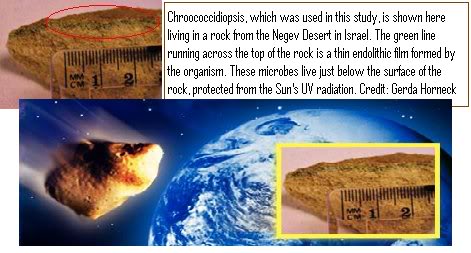[center]

Space Rocks Could Reseed Life on Earth[/center
Asteroid and comet impacts on Earth can cause catastrophic extinction events. They can also bring life back, new research shows.
Many scientists believe that a massive rock from space came crashing down 65 million years ago at the end of the Cretaceous Period. The resulting blast set forests ablaze. The skies of Earth were filled with ash that blocked out the sun, and the planet went cold. Vegetation died in the absence of sunlight. Shortly thereafter, the dinosaurs and many other life forms on Earth went extinct. Millions of years of evolution were wiped clean in an instant.
It's frightening that one instantaneous event could completely change the face of life on Earth. However, a new study supports longstanding suggestions that asteroid impacts could also help spread life throughout the universe.
Rocks that are ejected from the Earth — or any other life-bearing planet — by an asteroid impact might actually protect microbes living inside them while they float through space. These rocks could then fall to the surface of other planets, or even back to their planet of origin.
In this way, the microbes could return to their home planet and "re-colonize" the surface after the disastrous effects of the asteroid impact have worn off.
Blast off
In order for organisms to survive a trip into orbit, they must endure a series of life-threatening events.
First there's the asteroid impact itself. Then there's the force of being launched into space. Next, they must travel in the harsh environment of space until a planet's gravity reels them in. This means facing an environment of extreme cold, intense radiation and vacuum exposure. Finally, they need to fall down through the atmosphere, experiencing extreme pressure, heating and the shock of landing.
Previous studies have shown that some rock-inhabiting organisms, known as "endoliths," might be able to survive a trip through space and a plunge through a planet's atmosphere to the surface. However, nobody knew whether these organisms could survive the initial trip into space.
Recently, an international team of researchers, led by Gerda Horneck of the Institute of Aerospace Medicine in Köln, Germany, selected a number of hardy microbes from Earth and tested their ability to hitchhike aboard rocks similar to martian meteorites.
The organisms used in the study included bacterial endospores, endolithic cyanobacteria and lichens. This selection provided a wider range of organisms than in other studies performed to date, including not just simple bacteria but also more complex eukaryotic organisms.
Smashing life
The researchers looked at previous studies of martian meteorites that provided information about the kinds of forces needed to eject rocks from a large planet. Using this data, the researchers developed a series of tests designed to simulate these pressures on the selected organisms.
By smashing the life-containing rocks between metal plates, the researchers were able to determine which organisms are capable of surviving different pressures caused by asteroid impacts and ejection into space. Ultimately, they discovered that a wide range of organisms would be capable of surviving impacts on Mars or Earth.
"Our results enlarge the number of potential organisms that might be able to reseed a planetary surface after early very large impact events, and suggest that such a re-seeding scenario on a planetary surface is possible with diverse organisms," the researchers report.
The research is detailed in the Spring 2008 issue of the journal Astrobiology.
By Aaron Gronstal, Astrobiology Magazine
posted: 15 May 2008 06:41 am ET








